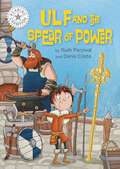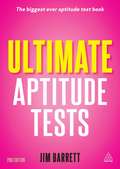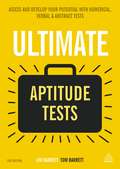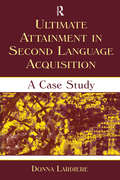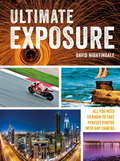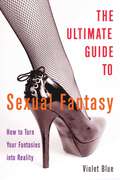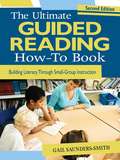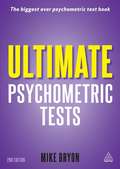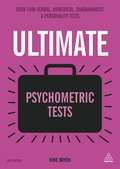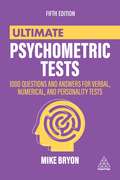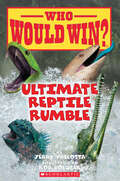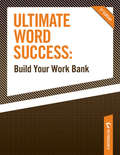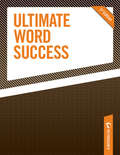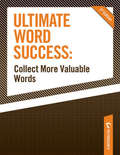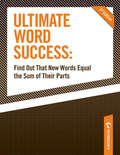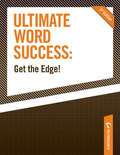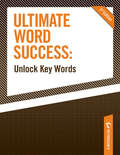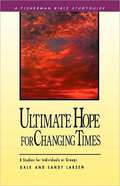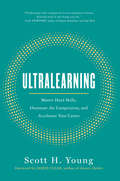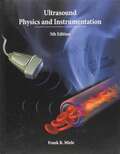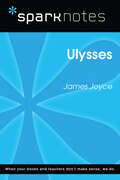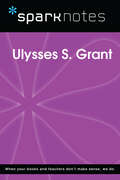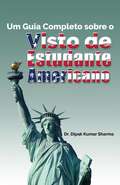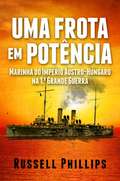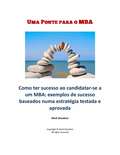- Table View
- List View
Ulf and the Spear of Power: Independent Reading White 10 (Reading Champion #517)
by Ruth PercivalThis story is part of Reading Champion, a series carefully linked to book bands to encourage independent reading skills, developed with Dr Sue Bodman and Glen Franklin of UCL Institute of Education (IOE) Fantastic, original stories are accompanied by engaging artwork and a reading activity. Each book has been carefully graded so that it can be matched to a child's reading ability, encouraging reading for pleasure. Perfect for 7-9-year-olds or those reading book band white.Ulf really wants to go and fight with Sigurd Spearhead and the other Vikings, but he must first prove that he is brave ...
Ultimate Aptitude Tests
by Jim BarrettTo measure your competence as well as your potential for achievement, aptitude tests are increasingly used by organisations to select the best staff for their teams and develop those already employed. Ultimate Aptitude Tests, now in its second edition, is the largest and most comprehensive book of its kind, boasting over 1000 realistic practice questions and detailed answers and explanations. Providing essential practice, it includes psychological tests that mirror those you are likely to encounter, including abstract visual tests, verbal and numerical reasoning aptitudes, practical skills and understanding as well as different types of mechanical and spatial tests.
Ultimate Aptitude Tests
by Jim BarrettMeasuring your competence as well as your potential for achievement, aptitude tests are increasingly used by organisations to select the best new staff for their teams as well as to develop those already employed. With them, businesses gain a greater level of certainty in their recruitment decisions and also use them to fast track potential leaders. Ultimate Aptitude Tests, now in its third edition and part of the best-selling Ultimate series, is the largest and most comprehensive book of its kind, boasting over 1000 varied practice questions with accompanying detailed answers and explanations. In such a competitive job market, this is the perfect book to ensure you're entirely prepared to get those high scores and impress potential employers. Providing essential practice, it includes psychometric tests that mirror those you are likely to encounter, including abstract visual tests, verbal and numerical reasoning aptitudes test, practical skills and understanding tests as well as different types of mechanical and spatial awareness tests. This new edition also now includes a brand new section on online testing environments as well as free access to a separate full online test to evaluate your abilities. Ultimate Aptitude Tests is brilliant preparation for candidates wishing to outshine their competition on the job market and secure their dream job.
Ultimate Attainment in Second Language Acquisition: A Case Study
by Donna LardiereThe first book-length treatment of its type, Ultimate Attainment in Second Language Acquisition is a case study with a solid theoretical grounding that examines the language of an immigrant learner of English, and thereby presents a much needed understanding of the linguistic competence of second language speakers. Based on longitudinal data collected over a period of 16 years, this clear and accessible presentation is well-grounded in linguistic theory and in second language acquisition research issues. Author Donna Lardiere presents the narrative of Patty, an adult Chinese immigrant learner of English, who achieves native-like proficiency in some areas of her English idiolect, although reaches a plateau in her language acquisition, known as the concept of fossilization. By addressing this concept, a central idea in second language acquisition research, Lardiere fills a void in existing literature. Individual chapters focus on Patty’s end state knowledge of grammatical areas of finiteness, past-tense marking, word order, wh-movement and relativization, passivization, number marking, and use of determiners. Important topics discussed throughout the book include:*learner variability in production;*case study methodology;*the roles of motivation and prior language (L1) knowledge; and*sensitivity to input in circumscribing ultimate attainment in adult second language acquisition. Ultimate Attainment in Second Language Acquisition is intended for anyone whose research is in the areas of second language acquisition, language acquisition, theoretical, applied, or developmental linguistics. It is also appropriate for graduate level students of TESOL and teachers who work with more advanced learners of foreign languages.
Ultimate Exposure: All You Need to Know to Take Perfect Photos with any Camera
by David NightingaleExposure is photography's fundamental concept. Master it, and you'll master photography.You don't need a book to take good photos any more; most (but not all) of the time your camera, or your phone, will handle things for you. But if you don't know what it's doing - you don't know how to expose photos - you can't join in the real fun of photography.With this book, though, you'll quickly master the key principles, and grasp a few simple concepts that will open up a world of beautiful sunsets, clever silhouettes, light trails and bokeh - as well as sophisticated techniques like HDR, manual exposure blending, and focus stacking.Armed with this knowledge the digital photos you share will stand head-and-shoulders above the rest, and you'll have no problem using that film camera or used Polaroid you picked up at that garage-sale.
Ultimate Guide to Sexual Fantasy: How to Have Incredible Sex with Role Play, Sex Games, Erotic Massage, BDSM and More
by Violet BlueJoin the legions of couples and singles who are making their hottest sexual fantasies come true. Whether you're looking for an endless supply of fantasy ideas or expert advice for a playful, imaginative sex life that turns you both on, this information-packed book has everything you need to know. The Ultimate Guide to Sexual Fantasy helps readers learn their lover's secret fantasies; engage in hot, dramatic role-play without feeling silly; have a threesome-without jealousy; explore sex parties and swinging; have sex in public; create thrilling S&M scenarios; make their own porn and erotic photos; and strip, give lap dances, and talk dirty. Also included are comprehensive lists of the most popular fantasies and fetishes complete with suggestions for props, toys, and costumes (and where to buy them), racy sex games for lovers, expert help for deciding just how far to take your fantasies, and hot new stories by best-selling erotica author Alison Tyler.
Ultimate Guided Reading How-To Book: Building Literacy Through Small-Group Instruction
by Gail Saunders-SmithGeared towards primary school teachers to understand the foundation for literacy development
Ultimate Psychometric Tests
by Mike BryonThe use of psychometric tests in job selection procedures is more prominent than ever and for unprepared candidates they represent a considerable challenge. The best-selling Ultimate Psychometric Tests, now in its second edition, is the biggest book of its kind, containing over 1000 practice test questions plus answers and explanations. Also including an overview of which companies employ which tests, including L'oreal, Sony, HMV, Toyota and IKEA among others, it has plenty of advice on how to get test-wise. Providing sample questions from all the major types of test, including verbal reasoning, numerical reasoning, personality questionnaires, non-verbal and diagrammatic reasoning and IQ tests, new tests include spatial recognition and visual estimation, situational awareness tests as well as quantities and conversion tests.
Ultimate Psychometric Tests
by Mike BryonThe use of psychometric tests in job selection procedures is more prominent than ever and for unprepared candidates they represent a considerable challenge that can get in the way of them successfully landing a new job. The best-selling Ultimate Psychometric Tests, now in its third edition, is the biggest book of its kind, containing over 1000 practice test questions of a multitude of different types of tests with accompanying answers and explanations. Also including an overview of which companies employ which tests, including L'Oreal, Sony, HMV, Toyota and IKEA among others, it has plenty of advice on how to get test-wise and seriously improve scoring. Providing sample questions from all the major types of test, including verbal reasoning, numerical reasoning, personality questionnaires, non-verbal and diagrammatic reasoning, new tests also now include spatial recognition and visual estimation, situational awareness tests as well as quantities and conversion tests. From the popular Ultimate series, this is the definitive guide to acing any type of psychometric testing you encounter as well as keeping your mind sharp and active.
Ultimate Psychometric Tests: 1000 Questions and Answers for Verbal, Numerical, and Personality Tests (Ultimate Series)
by Mike BryonDon't let a psychometric test - or your nerves - stand between you and your dream job.Many interviews and assessment centres include psychometric testing as part of the hiring process, and fears about tests are all too common and undermine confidence and performance on the day. But practice makes perfect - and with over 1,000 exercises from all the major types of test, Ultimate Psychometric Tests is the ideal tool to help you get to grips with:-verbal and numerical reasoning-personality questionnaires-non-verbal and diagrammatic reasoning-spatial recognition and visual estimation-situational awareness -quantities and conversion testsWith each test supported by detailed answers and explanations, Ultimate Psychometric Tests will boost your confidence and your performance on the day, to help you land your next dream job.About the series: The Ultimate series contains practical advice on essential job search skills to give you the best chance of getting the job you want. Taking you all the way from starting your job search to completing an interview, it includes guidance on CV or resume and cover letter writing, practice questions for passing aptitude, psychometric and IQ tests, and reliable advice for interviewing.
Ultimate Reptile Rumble (Who Would Win?)
by Jerry PallottaTwelve different reptiles battle it out in a huge fight! Who will be the champion?This nonfiction reader compares and contrasts 16 ferocious reptiles. Readers will learn about each animal's anatomy, behavior, and more. Then compare and contrast the battling animals before finally discovering the winner!This nonfiction series is full of facts, photos, and realistic illustrations, and it includes a range of mammals, sea creatures, insects, and dinosaurs to satisfy all kinds of animal fans.
Ultimate Word Success: Build Your Word Bank
by Laurie RozakisA great way to have fun while building your vocabulary.
Ultimate Word Success: Build a Bigger and Better Vovabulary
by Laurie RozakisThe key to test-taking success is practice. Ultimate Word Success prepares students who are studying for the PSAT, SAT, ACT, GED, and other standardized tests by providing scores of entertaining and engaging vocabulary-building exercises.
Ultimate Word Success: Collect More Valuable Words
by Laurie RozakisA great way to build your vocabulary while having fun.
Ultimate Word Success: Find Out That New Words Equal the Sum of Their Parts
by Laurie RozakisThis can help you sharpen your vocabulary skills for standardized tests.
Ultimate Word Success: Get the Edge
by Laurie RozakisThe perfect way for standardized test takers to sharpen their vocabulary skills.
Ultimate Word Success: Unlock Key Words
by Laurie RozakisA great way to have fun while building vocabulary.
Ultimate hope for Changing Times: 8 Studies for Individuals or Groups (Fisherman Bible Studyguide Series)
by Sandy Larsen Dale LarsenNone of us knows what the future holds. But in the midst of our uncertainty, God offers us real hope, a confidence in the certainty of who he is. This guide looks at the Christian's daily and eternal hope in Christ, reminding us that no matter how bad or good things are now, something far more awesome is on the way for God's people. Book jacket.
Ultralearning: Master Hard Skills, Outsmart the Competition, and Accelerate Your Career
by Scott YoungLearn a new talent, stay relevant, reinvent yourself, and adapt to whatever the workplace throws your way. Ultralearning offers nine principles to master hard skills quickly. This is the essential guide to future-proof your career and maximize your competitive advantage through self-education.In these tumultuous times of economic and technological change, staying ahead depends on continual self-education—a lifelong mastery of fresh ideas, subjects, and skills. If you want to accomplish more and stand apart from everyone else, you need to become an ultralearner. The challenge of learning new skills is that you think you already know how best to learn, as you did as a student, so you rerun old routines and old ways of solving problems. To counter that, Ultralearning offers powerful strategies to break you out of those mental ruts and introduces new training methods to help you push through to higher levels of retention. Scott H. Young incorporates the latest research about the most effective learning methods and the stories of other ultralearners like himself—among them Benjamin Franklin, chess grandmaster Judit Polgár, and Nobel laureate physicist Richard Feynman, as well as a host of others, such as little-known modern polymath Nigel Richards, who won the French World Scrabble Championship—without knowing French. Young documents the methods he and others have used to acquire knowledge and shows that, far from being an obscure skill limited to aggressive autodidacts, ultralearning is a powerful tool anyone can use to improve their career, studies, and life. Ultralearning explores this fascinating subculture, shares a proven framework for a successful ultralearning project, and offers insights into how you can organize and exe - cute a plan to learn anything deeply and quickly, without teachers or budget-busting tuition costs.Whether the goal is to be fluent in a language (or ten languages), earn the equivalent of a college degree in a fraction of the time, or master multiple tools to build a product or business from the ground up, the principles in Ultralearning will guide you to success.
Ultrasound Physics and Instrumentation
by Frank MieleIn Ultrasound Physics Instrumentation, 5e, Frank Miele's unique three-level approach makes ultrasound physics interesting and applicable to day-to-day scanning. Ultrasound Physics focuses on the underlying physics and basic concepts critical for developing skill in the use of diagnostic ultrasound. Level 2: Exam Level Ultrsound Physics covers basic topics often outlined on the credentialing exams. This section is intended to generate a more profound understanding of the concepts, emphasizing the relationship between the fundamentals of physics and the quality of a diagnostic study. Level 3: Advanced Ultrasound concepts and applications contain advanced topics and higher level material for those readers who want to be challenged.
Ulysses (SparkNotes Literature Guide Series)
by SparkNotesUlysses (SparkNotes Literature Guide) by James Joyce Making the reading experience fun! Created by Harvard students for students everywhere, SparkNotes is a new breed of study guide: smarter, better, faster. Geared to what today's students need to know, SparkNotes provides: *Chapter-by-chapter analysis *Explanations of key themes, motifs, and symbols *A review quiz and essay topicsLively and accessible, these guides are perfect for late-night studying and writing papers
Ulysses S. Grant (SparkNotes Biography Guide)
by SparkNotesUlysses S. Grant (SparkNotes Biography Guide) Making the reading experience fun! SparkNotes Biography Guides examine the lives of historical luminaries, from Alexander the Great to Virginia Woolf. Each biography guide includes:An examination of the historical context in which the person lived A summary of the person&’s life and achievements A glossary of important terms, people, and events An in-depth look at the key epochs in the person&’s career Study questions and essay topics A review test Suggestions for further reading Whether you&’re a student of history or just a student cramming for a history exam, SparkNotes Biography guides are a reliable, thorough, and readable resource.
Um Guia Completo sobre o Visto de Estudante Americano
by Dr Dipak Kumar Sharma RonaldoEste livro é praticamente a “mãe dos livros” com referência ao Visto de Estudante Americano. Faça a diferença entre estar lá e ter sucesso lá. Este livro é igualmente útil para estudantes internacionais que pretendem ira para os Estados Unidos e, também para aqueles que já são estudantes internacionais nos Estados Unidos. Um livro fácil de ler que mostra o passo a passo com perguntas e respostas em cada seção. Centenas de cenários da vida real abordados e explicados. Economize tempo e dinheiro, sem a necessidade de pagar advogados de imigração ou agentes de vistos privados. Não há necessidade de desperdiçar seu tempo pesquisando toneladas de material on-line, lendo blogs ou ouvindo boatos. Você terá todas as informações que provavelmente precisará saber (e mais), sobre seu visto de estudante em um único lugar.
Uma Frota Em Potência: Marinha Do Império Austro-Húngaro Na 1.ª Grande Guerra
by Russell Phillips André LeiteIlustrado com cerca de trinta fotografias e desenhos, este livro oferece uma abrangente e detalhada descrição dos navios que compunham a frota do Império Austro-Húngaro, das suas operações e dos seus problemas específicos, desde duelos parlamentares a navios construídos pela Hungria, país desprovido de costa. A Kaiserliche und Königliche Kriegsmarine -- Marinha Austro-Húngara -- Descrita desde o início da 1.ª Guerra Mundial quando o Arquiduque Franz Ferdinand e a sua esposa Sophie repousaram em câmara ardente no navio almirante, até ao final do conflito quando a própria marinha se dissolvia tal qual o seu império. Durante a Guerra, esta pequena mas poderosa "frota em potência" forçou os Aliados a manter um bloqueio nos Estreitos de Otranto enquanto submarinos Alemães e Austro-Húngaros semeavam o caos no Mediterrâneo apesar dos seus grandes navios quase nunca deixarem os seus portos de abrigo.
Uma Ponte Para O Mba
by Mark Dresdner Patricia FrancoO objetivo deste livro é guiar os candidatos aos curso de MBA nas mais renomadas escolas de Administração do mundo a prepararem suas candidaturas de uma forma correta e eficaz.Um dos maiores desafios dos candidatos está em como preencher o caderno de inscrição e escrever os Essays. Este é o ponto chave deste guia simples, didático e eficaz.A ponte para o MBA, construída por Mark Dresdner, busca levar o candidato a fazer uma análise de sua carreira profissional, sua formação acadêmica e sua vida pessoal de modo que esteja apto a escrever essays sinceros e que reflitam suas maiores realizações e conquistas.Para os leitores brasileiros, é de especial valor a inclusão dos essays originais em inglês, além da tradução, pois possibilita estudar o vocabulário e a construção do texto em língua inglesa possibilitando uma compreensão mais completa do tipo de texto que as comissões de admissão esperam receber.
